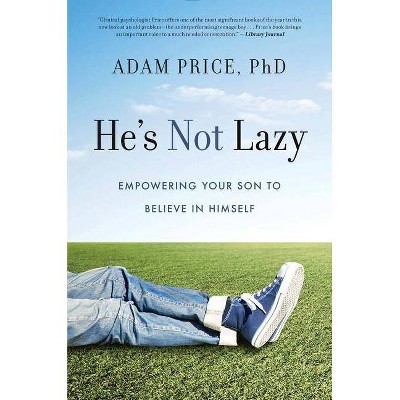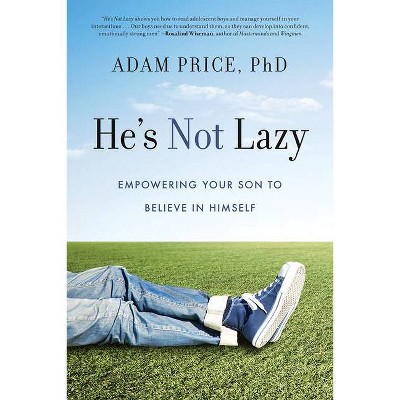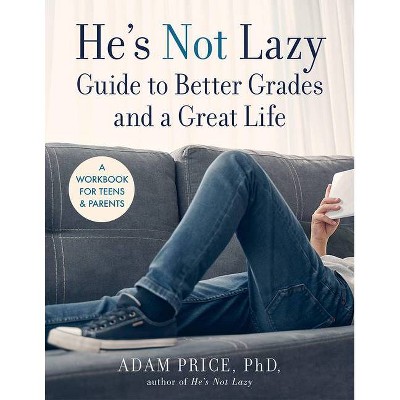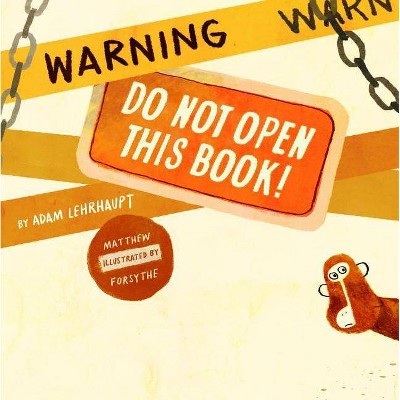He's Not Lazy - by Adam Price (Hardcover)

Similar Products
Products of same category from the store
AllProduct info
<p/><br></br><p><b> About the Book </b></p></br></br>On the surface, capable teenage boys may look lazy. But dig a little deeper, writes child psychologist Adam Price in <i>He's Not Lazy</i>, and you'll often find conflicted boys who want to do well in middle and high school but are afraid to fail, and so do not try. This book can help you become an ally with your son, as he discovers greater self-confidence and accepts responsibility for his future.<p/><br></br><p><b> Book Synopsis </b></p></br></br><b>"Clinical psychologist Price offers one of the most significant books of the year in this new look at an old problem--the underperforming teenage boy... Price's book brings an important voice to a much needed conversation." --<i>Library Journal </i>(Starred review)</b> <br> On the surface, capable teenage boys may look lazy. But dig a little deeper, writes child psychologist Adam Price in <i>He's Not Lazy</i>, and you'll often find conflicted boys who want to do well in middle and high school but are afraid to fail, and so do not try. This book can help you become an ally with your son, as he discovers greater self-confidence and accepts responsibility for his future.<p/><br></br><p><b> Review Quotes </b></p></br></br><br>*"<b>Clinical psychologist Price offers one of the most significant books of the year</b> in this new look at an old problem--the underperforming teenage boy. . . . With today's kids being pushed harder than ever to perform and succeed at an early age, <b>Price's book brings an important voice to a much needed conversation. VERDICT Highly recommended</b>." -- <i>Library Journal</i> (Starred review) <p/> "Price addresses a situation he refers to as 'opting out, ' in which teen boys appear lazy when in fact they are reacting to fear and pressure by shunning school with avoidance and denial. Price offers examples, lessons, and advice from his 25 years as a psychologist. While the book is filled with well-documented research, it is accessible to general readers. Price helps readers make a paradigm shift in how they view their sons' behavior, explains the science behind human brain development, provides instructions for creating a plan for success, and most importantly, outlines how parents can change their own attitudes. The parents' change in perspective is the most important key; in the process, they will help their sons create self-sufficient, self-regulated plans. Parents, college students, teachers, and psychologists will gain a better understanding of the problem and know how to help teen boys who are going through it have a successful school career. <b>A good addition for public library parenting collections as well as academic libraries.</b>" --<i>Booklist</i> <p/>"Price's book will provide inspiration for scores of parents seeking to understand why their sons are floundering, and will encourage greater acceptance for how today's teenage boys face challenges<i>.</i>" --<i>Publishers Weekly</i> <p/> "<i>. . . </i>a user-friendly text for parents and patients . . . Although geared towards an understanding of boys, many of these pearls of wisdom are easily applicable to girls given the authors heavy leaning on gender neutral developmental theories and science. . . . the unexpected genius of <i>He's Not Lazy</i> is the comprehensive yet gentle way Price explores parents' intergenerational contributions to their son's difficulties. This makes <i>He's Not Lazy</i> a worthy purchase for parents and clinicians alike." --<i>NJ Psychologist</i> <p/><br><br>"I am not sure whether I love <b><i>He's Not Lazy</i> </b>more as a mother of two teen boys or as an educator who has worked with boys for over twenty years. What I do know is that <b><i>He's Not Lazy</i> </b>offers a truly thoughtful, commonsense approach to dealing with adolescent boys. It shows you how to read them and manage yourself in your interactions with these sometimes mysterious and frustrating people. And the stakes really couldn't be higher: Our boys need us to understand them, so they can develop into confident, emotionally strong men." <br> --Rosalind Wiseman, educator and author of <i>Queen Bees and Wannabes, 3rd Edition: Helping Your Daughter Survive Cliques, Gossip, Boys, and the New Realities of Girl World</i><i> and Wingmen: Helping Our Boys Cope with Schoolyard Power, Locker-Room Tests, Girlfriends, and the New Rules of Boy World</i><br><p/><br></br><p><b> About the Author </b></p></br></br>Adam Price, PhD, a clinical psychologist and author, has worked with children, adolescents, and their families for more than 25 years. He is an expert in learning disabilities and Attention Deficit Hyperactive Disorder (ADHD). Dr. Price lectures nationally to parents and educators, and has trained numerous clinicians in family and child therapy. He has written for both academic and popular publications, including the<i> Wall Street Journal </i>and <i>Family Circle Magazine</i>. Dr. Price maintains a private practice in New York City and Chatham, NJ. To learn more about Dr. Price, visit dradamprice.com.
Price History
Price Archive shows prices from various stores, lets you see history and find the cheapest. There is no actual sale on the website. For all support, inquiry and suggestion messagescommunication@pricearchive.us




















